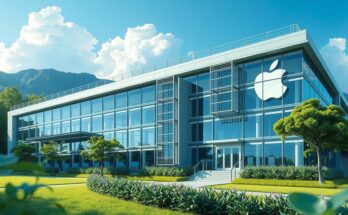Tesla Inc. plans to enter the Saudi Arabian market in April 2025 after experiencing a 42.6% decline in European sales. Scheduled events in Riyadh will showcase Tesla’s EVs and other innovations. Saudi Arabia’s investment in EV startups and its Vision 2030 strategy align with Tesla’s market entry, amidst uncertainties regarding local production and funding.
Elon Musk’s Tesla Inc. is set to penetrate the Saudi Arabian market in early April 2025, as stated in a press release dated March 26. Currently, Tesla’s electric vehicles are distributed throughout the Middle East, excluding Saudi Arabia, which is the largest market in the Gulf region. This strategic decision is aimed at exploring new growth opportunities while addressing challenges in more established markets.
A press conference is scheduled for April 10 in Riyadh, where Tesla will present its electric vehicles, humanoid robots, and solar-powered products. Analysts anticipate that the Model Y and Cybertruck will play crucial roles in Tesla’s introduction to the Saudi market. Concurrently, Tesla’s sales have experienced a 42.6% decline in Europe compared to the previous year, compounded by protests in the U.S. against Musk’s policies regarding federal agency staffing and aid cuts.
As part of Saudi Arabia’s Vision 2030 economic diversification strategy, significant investments have been made in electric vehicle startups, including Lucid Group, which has benefitted from substantial funding from the Saudi Public Investment Fund (PIF) that enabled the opening of a manufacturing plant in 2024. Although Musk has previously denied negotiations for a Tesla factory in Saudi Arabia, industry experts speculate that local production may be essential if import regulations become stricter.
Saudi Arabia is fostering its own electric vehicle ecosystem, as exemplified by the launch of Ceer, the first EV manufacturer in the kingdom. In November 2024, Ceer partnered with Rimac Technology from Croatia to produce high-performance electric drive systems. This joint venture, funded by PIF and Foxconn, aims to design EVs for local and MENA markets, projected to attract over $150 million in foreign direct investment and contribute $8 billion to the kingdom’s GDP by 2034.
Tesla is a renowned American manufacturer specializing in electric vehicles, charging stations, and energy storage systems, with its headquarters in Austin, Texas. In 2018, the company and Musk agreed to pay $40 million and implement corporate governance changes to resolve SEC charges of securities fraud related to misleading tweets about taking Tesla private. Musk was required to step down as chairman for three years while continuing as CEO.
Currently, it remains unclear whether Musk is pursuing funding from the Saudi government amidst falling sales in other markets. Nonetheless, analysts emphasize that the kingdom’s sovereign wealth fund possesses both the capital and strategic interest to potentially become a significant investor in Tesla.
In summary, Tesla’s strategic entry into the Saudi market marks a significant maneuver as the company seeks growth amidst decreasing sales in other regions. With the collaboration of Saud Arabia’s economic vision, coupled with ongoing investments in the emerging EV ecosystem, this development may present beneficial opportunities for both Tesla and the Saudi economy. Observations regarding local manufacturing and funding from the Saudi government will be crucial moving forward.
Original Source: www.intellinews.com




